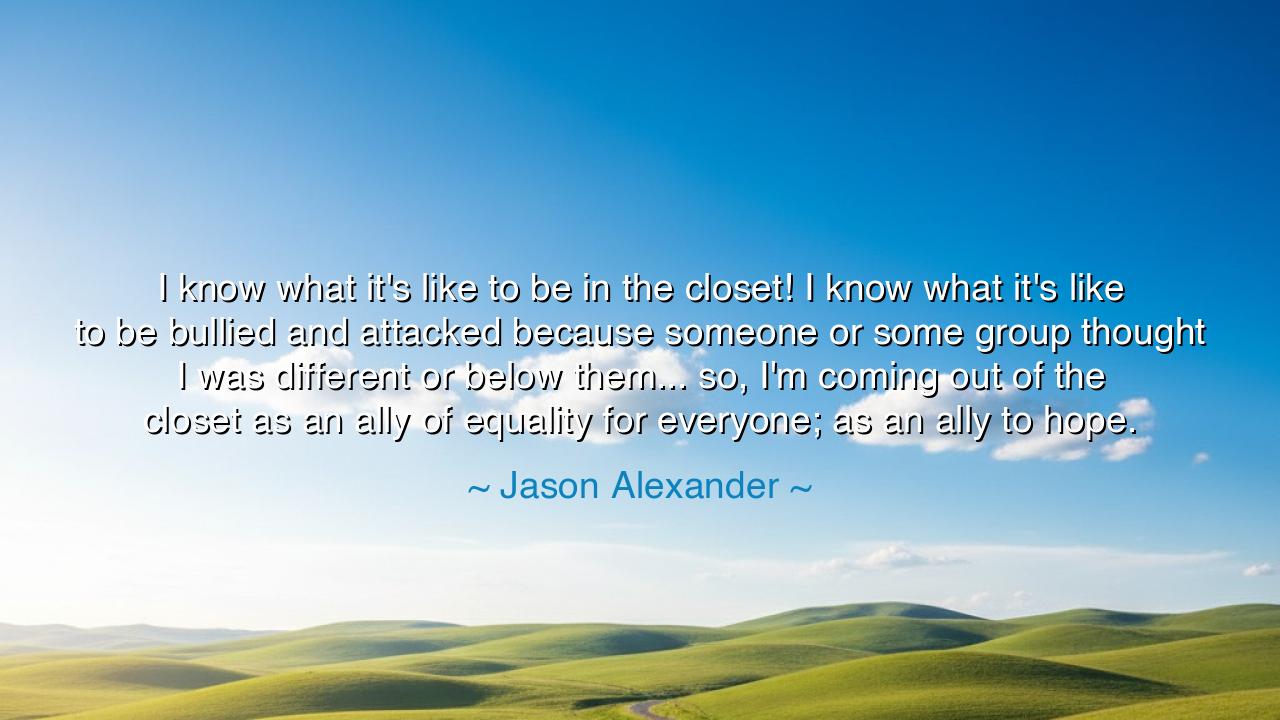
I know what it's like to be in the closet! I know what it's like
I know what it's like to be in the closet! I know what it's like to be bullied and attacked because someone or some group thought I was different or below them... so, I'm coming out of the closet as an ally of equality for everyone; as an ally to hope.






In the heartfelt and courageous words of Jason Alexander, the actor and advocate known for his empathy as much as his art, there burns a light of compassion and humility: “I know what it’s like to be in the closet! I know what it’s like to be bullied and attacked because someone or some group thought I was different or below them... so, I’m coming out of the closet as an ally of equality for everyone; as an ally to hope.” These words carry the weight of both confession and conviction. They are not spoken from a place of privilege, but from the depths of shared suffering—an acknowledgment that pain, when transmuted by understanding, becomes the seed of solidarity.
The meaning of this quote shines in its dual message of empathy and courage. Alexander speaks first from personal experience—of knowing the sting of exclusion, the wounds of mockery, the isolation of feeling “other.” He has known what it means to hide one’s true self, whether from fear or from the cruelty of a world that punishes difference. Yet rather than allow bitterness to take root, he transforms that pain into compassion, stepping forward as an ally of equality—one who stands not only for himself, but for all who suffer the injustice of judgment. His “coming out” is a spiritual declaration, a renewal of purpose: to side with hope over hatred, with understanding over indifference.
The origin of these words rests in the long and noble lineage of those who have stood beside the marginalized. Jason Alexander, though best known for his comedy, speaks here as a man who has recognized that laughter and love spring from the same source—the recognition of our shared humanity. His message arose in a time when the fight for LGBTQ+ rights and universal equality was pressing forward, but still met with resistance. To “come out” as an ally is to take a stand in that struggle—to declare that equality is not a favor granted to a few, but the birthright of all souls. His voice joins those of countless others, past and present, who have chosen to walk in empathy’s light rather than fear’s shadow.
To understand his words more deeply, we can look to the story of Eleanor Roosevelt, a woman who, like Alexander, used her influence to champion the overlooked and oppressed. In her time, she was mocked, criticized, and dismissed for her devotion to civil rights and her defense of the poor. Yet she persisted, saying, “Where, after all, do universal human rights begin? In small places, close to home.” Like Alexander, she understood that the fight for equality does not belong only to those directly oppressed, but to all who believe in justice. Her courage, rooted in compassion, transformed her era—and her example lives on as proof that allies are often the bridge between suffering and change.
Alexander’s words also carry the quiet strength of vulnerability. He admits to having been afraid, to having once hidden himself away from judgment. This honesty is its own kind of bravery, for to reveal our weakness is to give others permission to heal. His statement reminds us that oppression is not only the burden of those who endure it, but the shame of those who ignore it. When he says, “I am coming out of the closet as an ally of equality,” he teaches us that allyship begins not with perfection, but with awakening—the moment one’s heart breaks open to the pain of another and refuses to turn away.
His message echoes the wisdom of the ancients, who taught that true strength lies in compassion, not domination. In ancient times, the hero was not only the warrior who conquered his enemies, but the one who lifted others from despair. In this modern retelling of heroism, Alexander calls each of us to be such heroes—not by wielding swords, but by wielding kindness, by standing beside the outcast and the mocked, by saying, “You are not alone.” In his voice, we hear a plea that transcends politics and identity: that to defend equality is to defend the sacredness of life itself.
Therefore, O listener, take this lesson into your heart: that empathy is the highest form of courage. Do not wait until injustice touches your own life to speak. When you see someone cast aside for their difference, stand beside them; when you hear mockery, speak truth; when others fall silent, let your voice rise. To be an ally of equality is not a title to be claimed, but a responsibility to be lived daily—in action, in understanding, in love. For when one heart stands up for another, hope is reborn.
And so remember the enduring wisdom of Jason Alexander: that out of pain can come purpose, and from understanding can bloom unity. To be an ally to hope is to light a candle in the world’s darkest corners—to stand, as the ancients would say, with courage in the face of cruelty, and with compassion in the presence of suffering. For in the end, equality is not only justice—it is the heartbeat of humanity itself.






AAdministratorAdministrator
Welcome, honored guests. Please leave a comment, we will respond soon